|
Books Should Be Free Loyal Books Free Public Domain Audiobooks & eBook Downloads |
|
|
Books Should Be Free Loyal Books Free Public Domain Audiobooks & eBook Downloads |
|
Ancient Texts |
|---|
|
Book type:
Sort by:
View by:
|
By: The Venerable Bede (673-735) | |
|---|---|
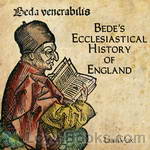 Ecclesiastical History of England
Ecclesiastical History of England
Bede's Ecclesiastical History of England is a work in Latin by Bede on the history of the Christian Churches in England, and of England generally; its main focus is on the conflict between Roman and Celtic Christianity. It is considered to be one of the most important original references on Anglo-Saxon history. It is believed to have been completed in 731, when Bede was approximately 59 years old. Divided into five books, it covers the history of England, ecclesiastical and political, from the time of Julius Caesar to the date of its completion (731)... | |
By: Unknown | |
|---|---|
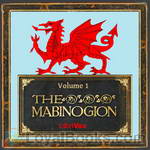 The Mabinogion
The Mabinogion
Sample a moment of magic realism from the Red Book of Hergest: On one side of the river he saw a flock of white sheep, and on the other a flock of black sheep. And whenever one of the white sheep bleated, one of the black sheep would cross over, and become white; and when one of the black sheep bleated, one of the white sheep would cross over, and become black. Before passing on to the Mabinogion proper, Lady Charlotte Guest devotes Volume I of her compilation of medieval Welsh tales to three brief romances of Arthur’s Court... | |
By: St. Benedict of Nursia (ca. 480-547) | |
|---|---|
 The Rule of St. Benedict
The Rule of St. Benedict
The Rule of Saint Benedict (Regula Benedicti) is a book of precepts written by St. Benedict of Nursia for monks living communally under the authority of an abbot. Since about the 7th century it has also been adopted by communities of women. During the 1500 years of its existence, it has become the leading guide in Western Christianity for monastic living in community. The spirit of St Benedict's Rule is summed up in the motto of the Benedictine Confederation: pax ("peace") and the traditional ora et labora ("pray and work").(Introduction from Wikipedia) | |
By: Jewish Publication Society of America (1917) | |
|---|---|
 Genesis (JPSA)
Genesis (JPSA)
The first book of the Pentateuch - Genesis. Presented according to weekly parshah.Praised are You, Adonai, Our G-d, ruler of the Universe, who has made us holy with commandments and commanded us to engage in the study of Torah. | |
By: Thomas Whittaker (1856-1935) | |
|---|---|
 The Origins of Christianity
The Origins of Christianity
The full title of this book is The Origins of Christianity with an Outline of Van Manen’s Analysis of The Pauline Literature. Willem Christiaan van Manen (1842-1905) was a Dutch theologian. The vast majority of van Manen’s radical criticism of the New Testament and Christian origins has never been translated into English.In this book, Thomas Whittaker outlines the arguments of van Manen for an English-speaking audience. Van Manen’s work is not now generally known, but his views obtained notoriety by the articles and books that he wrote, in which he maintained that none of the Epistles that bear the Apostle Paul’s name were in fact written by him... | |
By: Aristotle (384-422) | |
|---|---|
 On the Heavens
On the Heavens
On the Heavens (Greek: Περί ουρανού, Latin: De Caelo or De Caelo et Mundo) is Aristotle's chief cosmological treatise. In it Aristotle argues that the Earth is a sphere by pointing to the evidence of lunar eclipses. Aristotle also provides a detailed explanation of his theory of 'gravity' arguing that things which contain 'earth' fall towards the centre of the Universe because 'earth' is naturally attracted to the centre of the Universe. Aristotle argues that if the planet Earth was moved to the location of the Moon then objects which contain 'earth' would not fall towards the centre of the Earth but rather towards the centre of the Universe... | |
 On Generation and Corruption
On Generation and Corruption
On Generation and Corruption (Ancient Greek: Περὶ γενέσεως καὶ φθορᾶς, Latin: De Generatione et Corruptione, also known as On Coming to Be and Passing Away) is a treatise by Aristotle. Like many of his texts, it is both scientific and philosophic (although not necessarily scientific in the modern sense). The philosophy, though, is essentially empirical; as in all Aristotle's works, the deductions made about the unexperienced and unobservable are based on observations and real experiences... | |
By: Gaius Petronius Arbiter | |
|---|---|
 The Satyricon
The Satyricon
Satyricon (or Satyrica) is a Latin work of fiction in a mixture of prose and poetry. It is believed to have been written by Gaius Petronius, though the manuscript tradition identifies the author as a certain Titus Petronius. As with the Metamorphoses of Apuleius, classical scholars often describe it as a "Roman novel", without necessarily implying continuity with the modern literary form.The surviving portions of the text detail the misadventures of the narrator, Encolpius, and his lover, a handsome sixteen-year-old boy named Giton... | |
By: Hippolytus of Rome (170-235) | |
|---|---|
 Treatise on Christ and Antichrist
Treatise on Christ and Antichrist
In this late second century treatise, Hippolytus gives an excellent summary of Early Christian thinking on the subject of the antichrist. Familiar texts from Daniel and Revelation are treated together with his own current events to give a unique perspective. (Summary by Jonathan Lange) | |
By: Pliny the Elder | |
|---|---|
 The Natural History, volume 2
The Natural History, volume 2
Naturalis Historia (Latin for "Natural History") is an encyclopedia published circa AD 77-79 by Pliny the Elder. It is one of the largest single works to have survived from the Roman empire to the modern day and purports to cover the entire field of ancient knowledge, based on the best authorities available to Pliny. The work became a model for all later encyclopedias in terms of the breadth of subject matter examined, the need to reference original authors, and a comprehensive index list of the contents... | |
By: Aristotle (384 BCE-322 BCE) | |
|---|---|
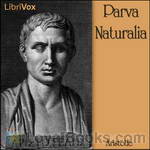 Parva Naturalia
Parva Naturalia
Parva Naturalia [the "short treatises on nature" (a conventional Latin title first used by Giles of Rome)] is a collection of books by Aristotle, which discuss natural phenomena involving the body and the soul. The books are as follows:I - On Sensation and the SensibleII - On Memory and RecollectionIII - On Sleeping and WakingIV - On DreamsV - On Prophecy in SleepVI - On Longevity and Shortness of LifeVII - On Youth and Old Age, Life and Death VIII - On Respiration | |
By: Plato (424-348 BC) | |
|---|---|
 Laws
Laws
Νόμοι (Laws) is Plato's final dialogue written after his attempt to advise the tyrant Dionysius II of Syracuse. The dialogue takes place between: an Athenian Stranger (Socrates? A god in human form?); the quiet Lacedaemonian Megillus; and the Cretan Cleinias. The Stranger asks whether humans live to be more effective at waging war or if there is something more important a legislator should seek to achieve. During their pilgrimage Cleinias discloses his role in the establishment of a new colony... | |
By: Athanasius of Alexandria (297-373) | |
|---|---|
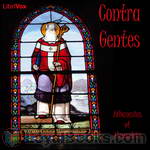 Contra Gentes
Contra Gentes
Contra Gentes is the first of a two volume work published by Athanasius of Alexandria prior to the outbreak of the Arian controversy (ca. 319). It focuses especially on pagan beliefs and worship concluding with a defense of the Christian view of God and creation -- especially creation by the eternal Word. In this way, the ground is prepared for the second volume of his work, now published separately under the title De Incarnatione Verbi. | |
By: Aeschylus (c. 525 BCE - c. 456 BCE) | |
|---|---|
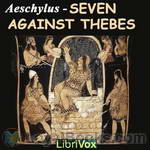 Seven Against Thebes
Seven Against Thebes
In this, the only extant tragedy from Aeschylus' trilogy about the House of Oedipus, Thebes is under siege from Polynices, a former prince of Thebes. After King Oedipus left his city and cursed the princes, Polynices and his brother, Eteocles, decided to rule alternately, switching at the end of every year. However, at the end of his year as king, Eteocles refused to turn power over to his brother and exiled him, fulfilling his father's curse that the two brothers could not rule peacefully. In the action of the play, Polynices and a group of Argive soldiers are attacking Thebes so that he can take his place as ruler... | |
By: Marcus Fabius Quintilianus | |
|---|---|
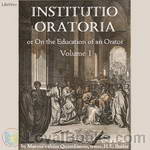 Institutio Oratoria or On the Education of an Orator, volume 1
Institutio Oratoria or On the Education of an Orator, volume 1
Marcus Fabius Quintilianus was of Spanish origin, being born about 35 A.D. at Calagurris. At Rome he met with great success as a teacher and was the first rhetorician to set up a genuine public school and to receive a salary from the State. He left behind him a treatise "On the causes of the decadence of Roman oratory" (De causis corruptae eloquentiae), some speeches and his magnum opus, the only one to survive to our days. His Institutio Oratoria, despite the fact that much of it is highly technical, has still much that is of interest today, even for those who care little for the history of rhetoric. | |
By: John Wycliffe (1328-1384) | |
|---|---|
 Ecclesiastes (Wycliffe, 1395)
Ecclesiastes (Wycliffe, 1395)
“… an alemaunde tre schal floure, a locuste schal be maad fat, and capparis schal be distried; for a man schal go in to the hous of his euerlastyngnesse…” – Eccl. xii, 5 (see Note below).Traditionally composed by Solomon sometime around 950-970 BCE but dated on linguistic evidence somewhere in the third century, this meditation on the futility of mankind’s striving can bring comfort to those of firm or fragile faith, or of no faith at all. The text used here is a revision of Wycliffe’s original translation, made by his follower John Purvey in the mid-1390s... | |
By: Frank Linderman (1869-1938) | |
|---|---|
 Indian Why Stories: Sparks from War Eagle's Lodge-Fire
Indian Why Stories: Sparks from War Eagle's Lodge-Fire
Delightful fables, collected by a devotee of Indian lore, recounts many of the legends told to him by tribal members, among them intriguing explanations of "Why the Chipmunk's Back is Striped," "How the Otter Skin Became Great Medicine," "How the Man Found His Mate," and "Why Blackfeet Never Kill Mice." | |
By: Plato (Πλάτων) (c. 428 BC - c. 347 BC) | |
|---|---|
 Gorgias
Gorgias
This dialogue brings Socrates face to face with the famous sophist Gorgias and his followers. It is a work likely completed around the time of "Republic" and illuminates many of the spiritual ideas of Plato. The spirituality, as Jowett points out in his wonderful introduction, has many ideas akin to Christianity, but is more generous as it reserves damnation only for the tyrants of the world. Some of the truths of Socrates, as presented by Plato, shine forth in this wonderful work on sophistry and other forms of persuasion or cookery. | |
By: Unknown (427? BC - 347? BC) | |
|---|---|
 Theaetetus
Theaetetus
Theaetetus (Ancient Greek: Θεαίτητος) discusses concepts including perception, true judgment and knowledge. Socrates compares the human mind to a piece of wax and is critical of lawyers who seek only to persuade. | |
By: Jewish Publication Society of America | |
|---|---|
 Exodus (JPSA)
Exodus (JPSA)
The second book of the Pentateuch - Exodus. Presented according to weekly parshah.Praised are You, Adonai, Our G-d, ruler of the Universe, who has made us holy with commandments and commanded us to engage in the study of Torah. (Introduction by Linette Geisel & traditional prayer. Parshat descriptions provided by Wikipedia) | |
By: Unknown (427? BC - 347? BC) | |
|---|---|
 Parmenides
Parmenides
Parmenides (Ancient Greek: ΠΑΡΜΕΝΙΔΗΣ) recounts a meeting between Socrates, Zeno and Parmenides. Topics discussed include universals, plurality and the One. | |
 Statesman
Statesman
Statesman (Ancient Greek: Πολιτικός) discusses God's role in maintaining the universe and describes the statesman as a good shepherd who promotes intermarriage between the orderly and courageous. | |
 Sophist
Sophist
Sophist (Ancient Greek: Σοφιστής) discusses being and not-being while drawing a distinction between the philosopher and the sophist. | |
 Cratylus
Cratylus
Cratylus (ΚΡΑΤΥΛΟΣ) discusses whether things have names by mere convention or have true names which can only be correctly applied to the object named and may have originated from God. | |
 Charmides
Charmides
Charmides (Χαρμίδης) discusses the virtue of temperance. | |
 Laches
Laches
Laches (Λάχης) discusses examples of courage including weapons masters, soldiers who stand firm in battle, ferocious animals and the wise person who endures evils. | |
 Philebus
Philebus
Philebus (ΦΙΛΗΒΟΣ) discusses pleasure, wisdom, soul and God. | |
 Lysis
Lysis
Lysis (Λύσις) discusses friendship and love between the good and bad. | |
 Menexenus
Menexenus
Menexenus (ΜΕΝΕΞΕΝΟΣ) is thought to have been written by Plato (ΠΛΑΤΩΝ). The dialogue consists of Socrates (ΣΩΚΡΑΤΗΣ) recounting a funeral oration he claims to have learned from the female philosopher Aspasia (ΑΣΠΑΣΙΑ) who may have been wealthy, a courtesan or both. | |
 Euthydemus
Euthydemus
Euthydemus (Εὐθύδημος) and Dionysodorus the sophists discuss the meaning of words with Socrates. | |
By: Plato (Πλάτων) (c. 428 BC - c. 347 BC) | |
|---|---|
 Lesser Hippias
Lesser Hippias
This work may not be by Plato, or his entirely, but Jowett has offered his sublime translation, and seems to lean towards including it in the canon. Socrates tempted by irony to deflate the pretentious know-it-all Hippias, an arrogant polymath, appears to follow humour more than honour in this short dialogue. | |
By: Unknown (427? BC - 347? BC) | |
|---|---|
 Eryxias
Eryxias
Eryxias (ΕΡΥΞΙΑΣ) may not have been written by Plato (ΠΛΑΤΩΝ). The dialogue discusses whether wealth has value and what the aim of philosophy should be. | |